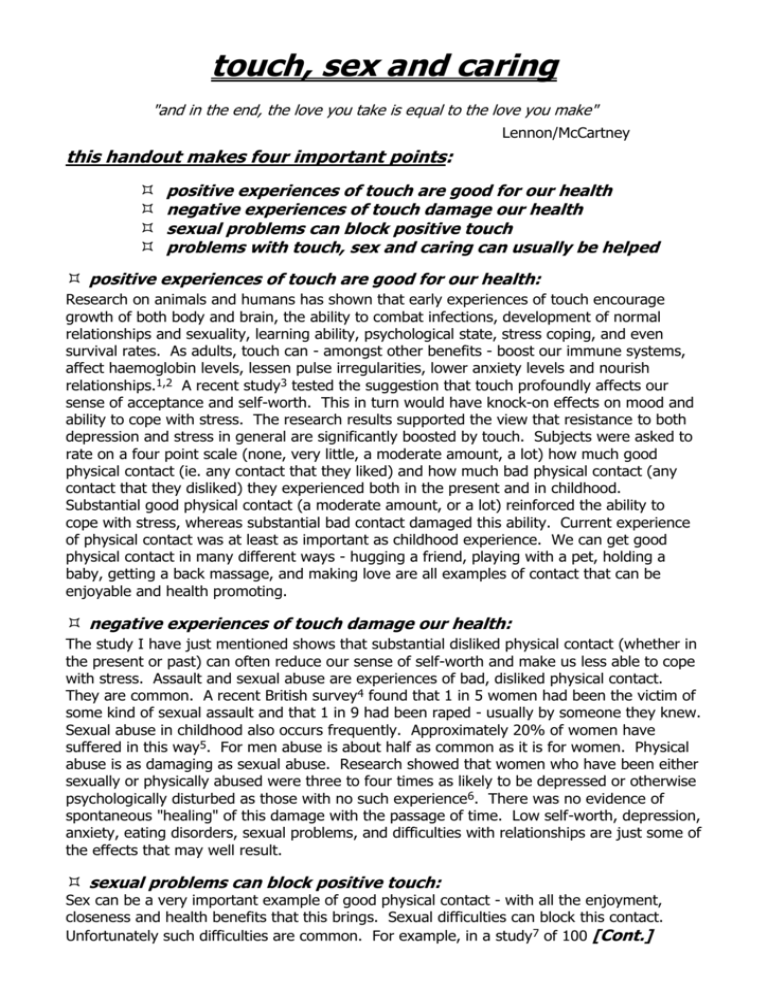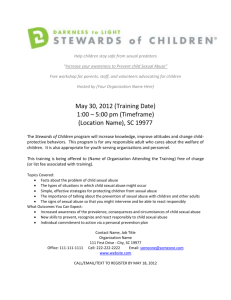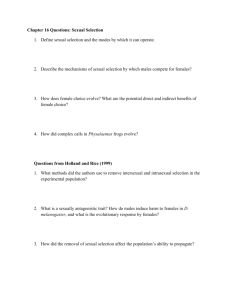
touch, sex and caring
"and in the end, the love you take is equal to the love you make"
Lennon/McCartney
this handout makes four important points:
positive experiences of touch are good for our health
negative experiences of touch damage our health
sexual problems can block positive touch
problems with touch, sex and caring can usually be helped
positive experiences of touch are good for our health:
Research on animals and humans has shown that early experiences of touch encourage
growth of both body and brain, the ability to combat infections, development of normal
relationships and sexuality, learning ability, psychological state, stress coping, and even
survival rates. As adults, touch can - amongst other benefits - boost our immune systems,
affect haemoglobin levels, lessen pulse irregularities, lower anxiety levels and nourish
relationships.1,2 A recent study3 tested the suggestion that touch profoundly affects our
sense of acceptance and self-worth. This in turn would have knock-on effects on mood and
ability to cope with stress. The research results supported the view that resistance to both
depression and stress in general are significantly boosted by touch. Subjects were asked to
rate on a four point scale (none, very little, a moderate amount, a lot) how much good
physical contact (ie. any contact that they liked) and how much bad physical contact (any
contact that they disliked) they experienced both in the present and in childhood.
Substantial good physical contact (a moderate amount, or a lot) reinforced the ability to
cope with stress, whereas substantial bad contact damaged this ability. Current experience
of physical contact was at least as important as childhood experience. We can get good
physical contact in many different ways - hugging a friend, playing with a pet, holding a
baby, getting a back massage, and making love are all examples of contact that can be
enjoyable and health promoting.
negative experiences of touch damage our health:
The study I have just mentioned shows that substantial disliked physical contact (whether in
the present or past) can often reduce our sense of self-worth and make us less able to cope
with stress. Assault and sexual abuse are experiences of bad, disliked physical contact.
They are common. A recent British survey4 found that 1 in 5 women had been the victim of
some kind of sexual assault and that 1 in 9 had been raped - usually by someone they knew.
Sexual abuse in childhood also occurs frequently. Approximately 20% of women have
suffered in this way5. For men abuse is about half as common as it is for women. Physical
abuse is as damaging as sexual abuse. Research showed that women who have been either
sexually or physically abused were three to four times as likely to be depressed or otherwise
psychologically disturbed as those with no such experience6. There was no evidence of
spontaneous "healing" of this damage with the passage of time. Low self-worth, depression,
anxiety, eating disorders, sexual problems, and difficulties with relationships are just some of
the effects that may well result.
sexual problems can block positive touch:
Sex can be a very important example of good physical contact - with all the enjoyment,
closeness and health benefits that this brings. Sexual difficulties can block this contact.
Unfortunately such difficulties are common. For example, in a study7 of 100 [Cont.]
happily married couples in their mid-30's, 40% of the men reported some problem with
erection or ejaculation, and 63% of the women reported some problem with arousal or
orgasm. In less healthy, older populations such difficulties become more frequent. Well
over a thousand men, of average age about 60, attending a general medical outpatient
department for other reasons were asked about sexual problems8. 1 in 3 reported
difficulties with erections severe enough to make intercourse nearly always unachievable.
Although many could have been helped and most were happy to have the chance to discuss
the problem once they were asked, only 6 out of over 400 had previously mentioned the
difficulty to their family doctor. Interestingly in the study of married couples, sexual
dissatisfaction was linked as much to factors such as loss of interest, lack of time, too little
foreplay or difficulty relaxing as to more obvious problems with erection or orgasm. Sexual
problems begin for many different reasons. Illness, side-effects of medicines, changes in
our bodies as we grow older, relationship problems and other factors can all trigger
difficulties. Once a sexual problem has begun, it is often prolonged and made worse by lack
of knowledge, difficulty in talking about such a personal subject, slowness in getting help,
and performance anxiety.
problems with touch, sex and caring can usually be helped:
Touch, sex and caring are of real importance for our general health and for our ability to
cope with stress. It is worth repeating that good physical contact can come in many
different ways. Shaking hands, hugging, stroking a pet, holding a child, exchanging a
shoulder rub, and making love are all examples of contact that can be both enjoyable and
good for our health. Physical contact that is inappropriate, unwanted, abusive, or
unpleasant produces negative effects on our health. Lack of knowledge, our upbringing,
difficulty communicating, early life experiences, sexual difficulties and relationship problems
can all get in the way of caring and being cared for. It can be very difficult to discuss such
personal issues. Health professionals however are now beginning to appreciate how
common and how important many of these problems are. Effective help9,10,11 is available both in and outside the NHS. Ask about it. It may take courage, but it's well worth it.
books and references:
Autton,N. (1989) Touch: an exploration, London: Darton, Longman and Todd.
Older,J. (1982) Touching is healing, New York: Stein and Day.
Cochrane,N. (1990) Physical contact experience and depression, Acta Psychiat Scand 82 suppl. 357: 1-91.
Public Eye. (1992) Acquaintance rape - hidden from view, hidden from justice? BBC2, 8.00pm., 14th Feb.
Bachmann,G.A., Moeller,T.P. & Benett,J. (1988) Childhood sexual abuse and the consequences in adult
women, Obstet Gynecol 71:631-42.
6. Mullen,P.E., Romans-Clarkson,S.E., Walton,V.A. & Herbison,G.P. (1988) Impact of sexual and physical abuse
on women's mental health, Lancet i: 841-45.
7. Frank,E.,Anderson,C. & Rubinstein,D. (1978) Frequency of sexual dysfunction in "normal" couples, New
England Journal of Medicine 299: 111-5.
8. Slag,M.F.,Morley,J.E.,et al (1983) Impotence in medical clinic outpatients, JAMA 249: 1736-40.
9. Hall,L. & Lloyd,S. (1989) Surviving child sexual abuse: a handbook for helping women challenge their past,
Basingstoke, Hants, Falmer Press.
10. Dickson,A. (1985) The mirror within: a new look at sexuality, London, Quartet Books.
11. Stanway,A. (1991) The lovers' guide, London, Pickwick Video. (VHS videotape).
1.
2.
3.
4.
5.







